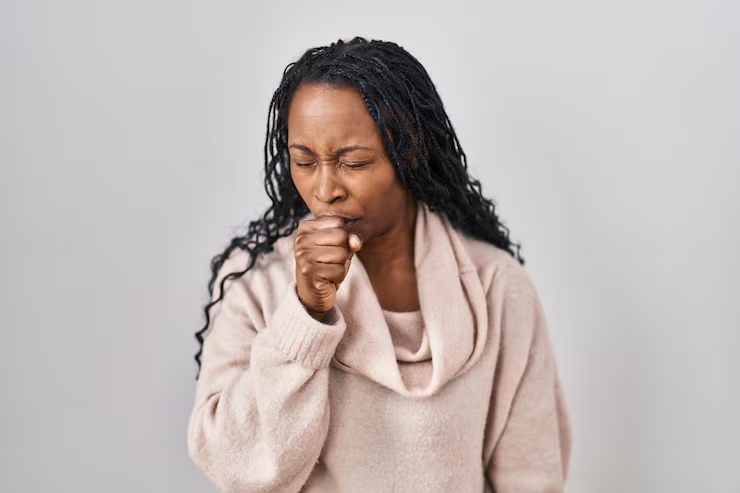The interplay of climate change and tuberculosis in Nigeria: Impacts, Vulnerabilities, and Pathways Forward
Published on 02 Oct, 2025

Introduction
Nigeria faces a dual crisis: a high Tuberculosis (TB) burden and increasing vulnerability to climate change. The nation is among the top 30 high-burden countries for TB, TB-HIV, and multidrug-resistant TB (MDR-TB) (Stop TB Partnership, n.d.-a).1 In 2020, an estimated 452,000 TB cases occurred, but only 138,591 (31%) were notified, indicating significant under-detection (Stop TB Partnership, n.d.-a).1 TB-related deaths reached an estimated 125,000 in 2021 (Duggirala et al., 2024).2 Concurrently, Nigeria is highly susceptible to climate change impacts like rising temperatures, altered rainfall, floods, droughts, and sea-level rise due to its geography and socioeconomic conditions (Atuyambe et al., 2024 3; Saunders et al., 2025 4).
While distinct, TB and climate change are interconnected. TB's spread is influenced by social, economic, and environmental determinants such as malnutrition, poverty, displacement, and poor housing—many of which are exacerbated by climate change (Saunders et al., 2025 4; Atuyambe et al., 2024 3). This report analyzes how climate change in Nigeria influences TB, focusing on pathways affecting TB determinants, vulnerable populations, and integrated response strategies. Direct epidemiological studies linking climate trends to TB incidence in Nigeria are scarce, but the strong connection between climate change and TB determinants warrants urgent attention (Saunders et al., 2025 4).
Climate change manifestations and impacts in Nigeria
Nigeria is experiencing rising temperatures, heatwaves, and altered rainfall leading to more intense floods and droughts (Atuyambe et al., 2024 3; Ekoh & Teron, 2023 7). The 2022 floods displaced 1.5 million people (Pashayan, 2024 8). Flooding, amplified by unplanned urbanization and inadequate drainage, contaminates water, damages infrastructure, and creates conditions for disease (Ekoh & Teron, 2023 7; Pashayan, 2024 8). Droughts, especially in the North, impact agriculture, leading to food insecurity and malnutrition (Atuyambe et al., 2024 3). Dust storms in the North worsen air quality and respiratory illnesses (Bayram et al., 2023 10; Rice et al., 2023 14). Coastal areas face sea-level rise, threatening settlements and freshwater sources.19 These impacts converge in informal urban settlements, which often lack basic services and are situated in hazard-prone areas, amplifying risks (Pashayan, 2024 8; Ekoh & Teron, 2023 7).
Key pathways linking climate change to Tuberculosis risk in Nigeria
Climate change indirectly influences TB by worsening its key determinants:
- Undermining nutrition and food security: Climate disruptions to agriculture (floods, droughts) lead to food shortages and malnutrition, a major risk factor for active TB (Saunders et al., 2025 4; Atuyambe et al., 2024 3).
- Forced migration, displacement, and crowding: Climate-related disasters force displacement into overcrowded shelters or informal settlements, ideal environments for TB transmission (Saunders et al., 2025 4). Rapid urbanization exacerbates this by concentrating people in areas with high climate and TB risks (Pashayan, 2024 8).
- Weakening health systems and access to care: Extreme weather can damage health facilities, disrupt transport and drug supplies, and divert resources, hindering TB diagnosis, treatment, and prevention (Atuyambe et al., 2024 3; Saunders et al., 2025 4).
- Degrading living environments: Flooding leads to damp, moldy housing and poor sanitation, while extreme heat makes poorly ventilated dwellings hazardous, increasing stress and susceptibility to illness (Pashayan, 2024 8; S_R31).
- Air quality compromises: Dust storms and heatwaves can worsen air pollution, which compromises respiratory health and may increase TB susceptibility (Bayram et al., 2023 10; Ojo & Adefuye, 2025 17).
Identifying vulnerable populations in Nigeria
Certain groups are disproportionately affected:
- Urban poor and informal settlement dwellers: High exposure to climate hazards, poor housing, lack of infrastructure, and poverty limit their adaptive capacity (Ekoh & Teron, 2023 7; Pashayan, 2024 8).
- Children: Developing respiratory and immune systems make them highly susceptible to air pollution, heat, infections, and malnutrition, increasing TB risk (Ojo & Adefuye, 2025 17; UNICEF Nigeria, 2021 18).
- Women: Biological factors, social roles (e.g., exposure to HAP from cooking), and socioeconomic disadvantages increase their vulnerability (Atuyambe et al., 2024 3; S_R97).
- Elderly, displaced persons, and those with pre-existing conditions: These groups face heightened physiological susceptibility and often have reduced adaptive capacity (Saunders et al., 2025 4; Atuyambe et al., 2024 3).
Recommendations for integrated action in Nigeria
Addressing the climate-TB nexus requires integrated, multi-sectoral strategies:
- Strengthen climate resilience within health sector & TB programs: Harden infrastructure, integrate climate data into health surveillance, develop contingency plans for TB services, and build health worker capacity (Saunders et al., 2025 4; Atuyambe et al., 2024 3).
- Integrate health (including TB) into climate policies: Mainstream TB in adaptation plans, conduct Health Impact Assessments for climate projects, and foster cross-sectoral collaboration (Saunders et al., 2025 4).
- Target interventions for vulnerable populations: Upgrade informal settlements with resilient infrastructure, ensure nutrition security through climate-resilient agriculture, provide healthcare for displaced persons, and accelerate the transition to clean household energy (Pashayan, 2024 8; Saunders et al., 2025 4).
- Enhance research, monitoring, and data systems: Fund research on climate-TB links in Nigeria, develop integrated surveillance systems, and improve air quality monitoring (Saunders et al., 2025 4; Ojo & Adefuye, 2025 17).
- Strengthen social protection: Implement climate-responsive social safety nets and address root causes of vulnerability like insecure land tenure and poverty (Saunders et al., 2025 4).
Conclusion
Climate change significantly threatens TB control in Nigeria by exacerbating key determinants like malnutrition, displacement, and healthcare disruption. Vulnerable populations, particularly the urban poor, children, and women, bear the heaviest burden. Urgent, integrated, and proactive strategies are needed to build resilience across health, food, and urban systems. Addressing the climate dimension of TB is crucial for Nigeria's public health and sustainable development.
References
- Stop TB Partnership. (2023, March). Nigeria: Digital TB surveillance system assessment report. https://tbassessment.stoptb.org/Nigeria.html
- Nweze, A. C., Adewale, A. O., & Ogunleye, T. A. (2024). A review of health system response to public health emergencies in Nigeria. Journal of Public Health in Africa, 15(3), 2908. https://doi.org/10.4081/jphia.2024.2908
- Frumkin, H., Haines, A., Smith, K. R., Andersen, Z. J., Bavel, B. V., Boykoff, M., Brauer, M., Burnett, R., Carlsten, C., Cassidy, M., Chan, E. Y. Y., Charlson, F., Cheng, I., Cissé, G., Cowie, H., Crippa, M., Dasandi, N., Dasgupta, P., Depoux, A., … The Lancet Countdown on health and climate change. (2024). The 2024 report of the Lancet Countdown on health and climate change: The imperative for a health-centred response in a world facing irreversible harms. The Lancet, 403(10441), 2307–2358. https://doi.org/10.1016/S0140-6736(23)02285-7
- Ben Ouedraogo, R., Klipstein-Grobusch, K., Sanon, D., Traore, M., Diallo, A., Ganame, J., Combary, A., Geubbels, E., & Jaeger, F. (2025). Climate change and tuberculosis: an analytical framework. medRxiv. https://doi.org/10.1101/2025.02.18.25322451
- Ben Ouedraogo, R., Klipstein-Grobusch, K., Sanon, D., Traore, M., Diallo, A., Ganame, J., Combary, A., Geubbels, E., & Jaeger, F. (2025). Climate change and tuberculosis: an analytical framework. medRxiv. https://doi.org/10.1101/2025.02.18.25322451 (Also found on ResearchGate: https://www.researchgate.net/publication/389187695_Climate_change_and_tuberculosis_an_analytical_framework)
- Ben Ouedraogo, R., Klipstein-Grobusch, K., Sanon, D., Traore, M., Diallo, A., Ganame, J., Combary, A., Geubbels, E., & Jaeger, F. (2025). Climate change and tuberculosis: an analytical framework. medRxiv. https://doi.org/10.1101/2025.02.18.25322451
- Adelekan, I. O., Olajide-Awosika, B., & Olokesusi, F. (2023). Vulnerable spaces, unequal responses: Lessons for climate adaptation from an informal settlement in Lagos, Nigeria. Frontiers in Sustainable Cities, 5, 929121. https://doi.org/10.3389/frsc.2023.929121
- McAppion, M., & Foy, R. (2023, March 28). Informal settlements and climate change in the ‘last mile of urbanization’. Brookings Institution. https://www.brookings.edu/articles/informal-settlements-and-climate-change-in-the-last-mile-of-urbanization/
- Moore, F. C. (2023, June 22). Why we can’t overlook people in addressing climate change. Brookings Institution. https://www.brookings.edu/articles/why-we-cant-overlook-people-in-addressing-climate-change/
- Carlsten, C., Balmes, J. R., Broome, R. A., Cooper, C. S. T., Koman, P. D., & Viegi, G. (for the American Thoracic Society Environmental Health Policy Committee and Climate Change and Respiratory Health Working Group). (2024). Impact of global climate change on pulmonary health: Susceptible and vulnerable populations. An official American Thoracic Society workshop report. Annals of the American Thoracic Society, 21(5, Suppl 2), S137–S153. https://doi.org/10.1513/AnnalsATS.202212-996CME
- Carlsten, C., Balmes, J. R., Broome, R. A., Cooper, C. S. T., Koman, P. D., & Viegi, G. (for the American Thoracic Society Environmental Health Policy Committee and Climate Change and Respiratory Health Working Group). (2024). Impact of global climate change on pulmonary health: Susceptible and vulnerable populations. An official American Thoracic Society workshop report. Annals of the American Thoracic Society, 21(5, Suppl 2), S137–S153. https://doi.org/10.1513/AnnalsATS.202212-996CME
- Carlsten, C., Balmes, J. R., Broome, R. A., Cooper, C. S. T., Koman, P. D., & Viegi, G. (for the American Thoracic Society Environmental Health Policy Committee and Climate Change and Respiratory Health Working Group). (2024). Impact of global climate change on pulmonary health: Susceptible and vulnerable populations. An official American Thoracic Society workshop report. Annals of the American Thoracic Society, 21(5, Suppl 2), S137–S153. https://doi.org/10.1513/AnnalsATS.202212-996CME
- UC Davis Health. (n.d.). Kent E. Pinkerton. UC Davis Profiles. https://profiles.ucdavis.edu/kent.pinkerton
- Pinkerton, K. E., Carlsten, C., Cooper, C. S. T., Koman, P. D., Malig, B. J., & Viegi, G. (for the American Thoracic Society Environmental Health Policy Committee). (2025). Climate change and respiratory health: Opportunities to contribute to environmental justice. An official American Thoracic Society workshop report. Annals of the American Thoracic Society. https://doi.org/10.1513/AnnalsATS.202502-219ST
- Pinkerton, K. E., Carlsten, C., Cooper, C. S. T., Koman, P. D., Malig, B. J., & Viegi, G. (for the American Thoracic Society Environmental Health Policy Committee). (2025). Climate change and respiratory health: Opportunities to contribute to environmental justice. An official American Thoracic Society workshop report. Annals of the American Thoracic Society. https://doi.org/10.1513/AnnalsATS.202502-219ST
- Pinkerton, K. E., Carlsten, C., Cooper, C. S. T., Koman, P. D., Malig, B. J., & Viegi, G. (for the American Thoracic Society Environmental Health Policy Committee). (2025). Climate change and respiratory health: Opportunities to contribute to environmental justice. An official American Thoracic Society workshop report. Annals of the American Thoracic Society. https://doi.org/10.1513/AnnalsATS.202502-219ST
- Onyeaghala, C. A., & Obidinma-Igwe, P. (2025). Air pollution and lung health: A significant public health challenge in resource poor countries. The Nigerian Health Journal, 25(1). https://tnhjph.com/index.php/tnhj/article/view/918
- UNICEF Nigeria. (2021, November 12). Nigeria has highest number of air pollution-related child pneumonia deaths in the world. https://www.unicef.org/nigeria/press-releases/nigeria-has-highest-number-air-pollution-related-child-pneumonia-deaths-world
- Adelekan, I. O., Whenu, O. J., & Nnaji, D. O. (2024). Vulnerability, resilience and adaptation of Lagos coastal communities to flooding. Earth Science, Systems and Society, 4(1), 10087. https://doi.org/10.3389/esss.2024.10087
